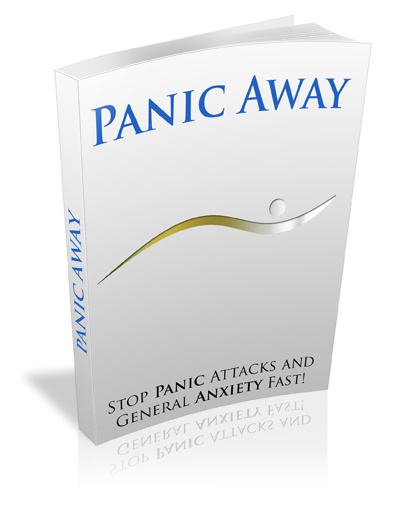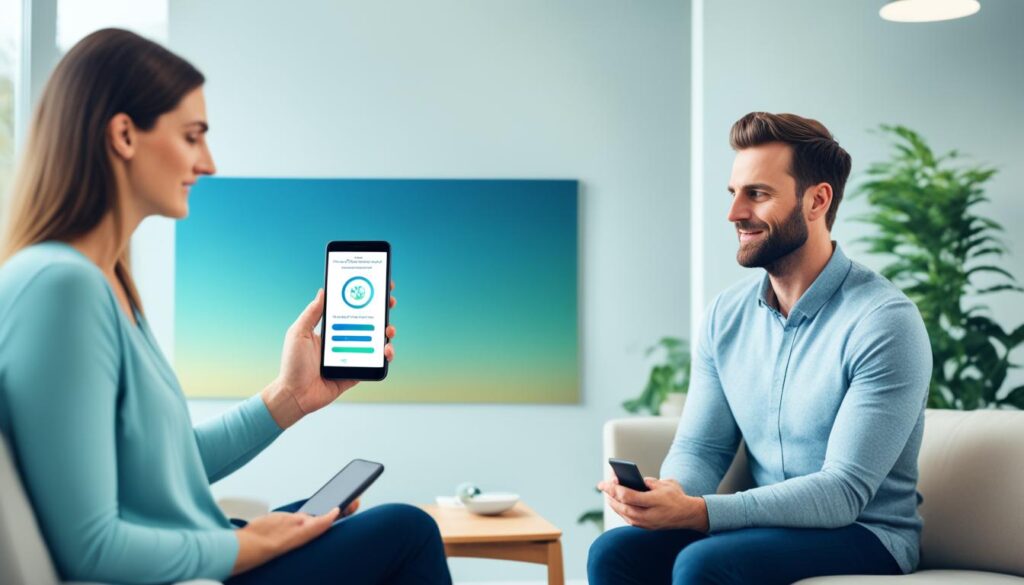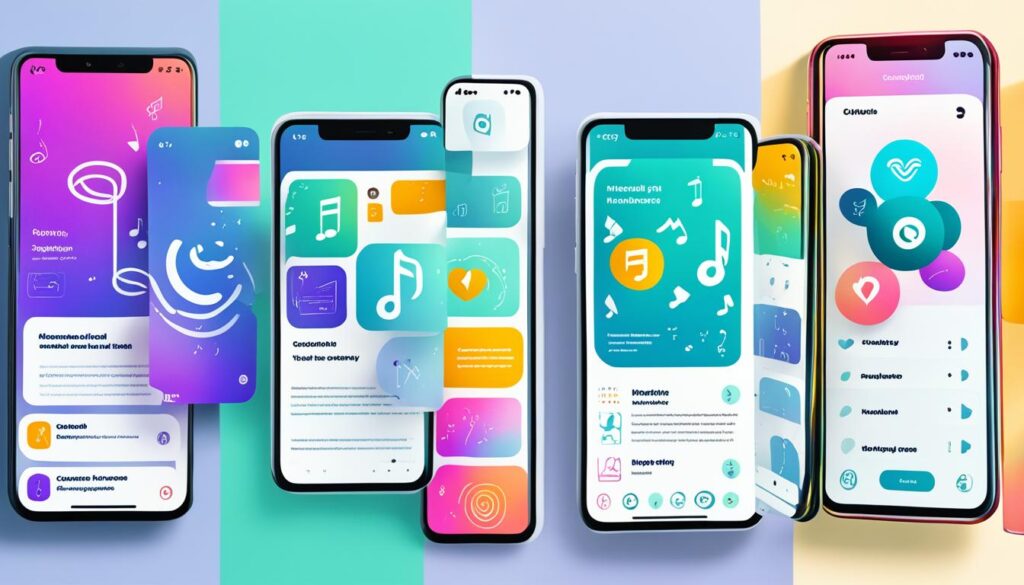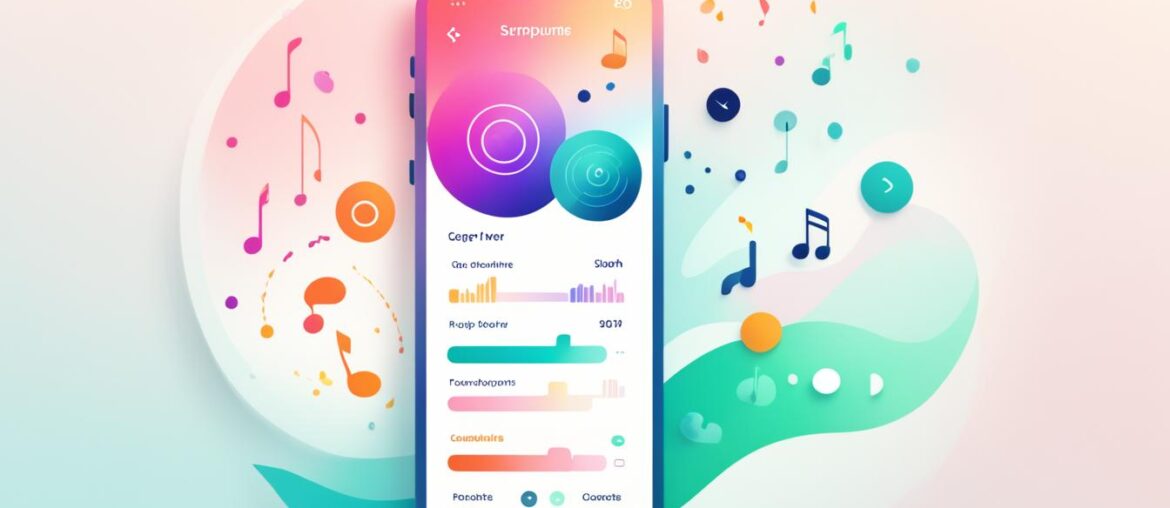As someone who has personally experienced the overwhelming grip of anxiety, I understand the desperate yearning for a moment of peace amidst the chaos that anxiety can bring. The racing thoughts, the tightness in the chest, the constant worry – it can feel suffocating and exhausting.
That's why I'm excited to share with you an incredible solution that has helped me and countless others find relief: music therapy apps. These apps harness the power of music to soothe anxiety and create a sense of calm. Whether you're on the go or in the comfort of your own home, these apps are like a guiding light, providing a musical escape to serenity.
Our Top Pick For Beating Panic Attacks

Stopping, and preventing, panic attacks is now even easier.
Key Takeaways:
- Music therapy apps offer a virtual sanctuary for anxiety sufferers, using music to create a sense of calm and relief.
- These apps provide accessible and affordable tools to help manage anxiety symptoms in daily life.
- Research has shown the benefits of mental health apps, but they should be used in conjunction with professional therapy.
- Choosing the right app involves considering factors such as price, features, and compatibility with your specific needs.
- While these apps are not a substitute for in-person therapy, they can be a valuable addition to a self-care routine.
- Explore the recommended music therapy apps to enhance your mental well-being and find tranquility in the midst of anxiety.
Understanding the Benefits of Mental Health Apps
Mental health apps offer several benefits to users. Firstly, they provide a private and anonymous space for exploration and support, which is especially valuable for individuals who feel stigmatized or are not yet ready for traditional therapy. Secondly, these apps tend to be affordable or even free, making them accessible to individuals without good mental health care coverage or limited financial resources.
| Benefits of Mental Health Apps | Description |
|---|---|
| Private and Anonymous | Users can comfortably seek support without fear of judgment or disclosing personal information. |
| Affordable or Free | Apps are accessible to individuals with limited financial resources or inadequate mental health care coverage. |
| Stress Reduction Tools | Apps teach coping skills and stress reduction techniques, enhancing overall well-being. |
“Mental health apps provide an inclusive and affordable support system for anyone seeking to improve their mental well-being.” – Dr. Jane Smith
Thirdly, mental health apps can teach stress reduction tools and coping skills that can improve overall quality of life. These apps can provide assistance with specific challenges such as life transitions, helping users navigate change and find stability. As mental health care gaps continue to exist, these apps play a crucial role in providing accessible support to individuals in need.
Who Can Benefit From Mental Health Apps?
Research suggests that mental health apps have a broad user base, catering to people of all ages. While adults are more inclined to utilize these apps compared to teenagers and young adults, it is interesting to note that men are more likely to engage with mental health apps than seek traditional therapy.
For many individuals, mental health apps serve as a supplement to therapy, providing valuable tools to support their mental well-being. These apps can also be beneficial for those who view them as a way to complete “homework” assigned by therapists. Some experts believe that mental health apps can provide immediate relief, helping individuals center themselves, set intentions for the day, and calm their symptoms.
It is important to recognize that mental health apps are not a substitute for professional care. While they offer valuable tools and resources, they should be used in conjunction with therapy and not as a replacement for it. Seeking help from licensed professionals is crucial for individuals experiencing severe distress, severe mental health conditions, or psychosis. In emergency situations, accessing mental health crisis resources is essential.
Overall, mental health apps cater to a diverse user base and offer support to individuals seeking to enhance their mental well-being. By providing accessible and convenient resources, these apps have the potential to positively impact the lives of many.
Common Mental Health Challenges and App Solutions
When it comes to addressing mental health challenges, there are a variety of apps available that cater to specific needs. These apps offer solutions and resources to help individuals manage their mental well-being effectively. Let's explore different types of mental health apps and the specific challenges they can help with.
Meditation Apps
Meditation apps focus on promoting mindfulness and relaxation through guided meditations and grounding exercises. These apps provide a wide range of meditation techniques, allowing users to find the ones that work best for them. Through regular practice, individuals can learn to calm their minds, reduce stress, and improve their overall well-being.
Coping Skills Apps
Coping skills apps are designed to teach individuals effective techniques for managing stress and building resilience. These apps offer games, activities, and online worksheets that help users develop healthy coping mechanisms. By strengthening their coping skills, individuals can navigate challenging situations more effectively and maintain their mental well-being.
Addiction Recovery Apps
For those on the journey of addiction recovery, apps tailored to addiction recovery can be incredibly valuable. These apps provide tools and resources to track progress, celebrate milestones, and offer support during difficult times. They can assist individuals in maintaining sobriety, reinforcing healthy habits, and connecting with a supportive community.
Anxiety and Depression Apps
Apps specifically created for anxiety and depression offer various solutions to manage symptoms and improve mental health. Some of these apps provide talk therapy with licensed providers, allowing individuals to access professional support conveniently. Others offer tools and techniques, such as journaling, breathing exercises, and mood tracking, to help individuals better understand and manage their anxiety or depression.
Sleep Improvement Apps
Good sleep is essential for physical and mental well-being. Sleep improvement apps aim to enhance sleep quality through various features. These apps may include sleepscapes, guided visual imagery, soothing music, and nature sounds to create a relaxing atmosphere conducive to better sleep. By incorporating these apps into their bedtime routine, individuals can improve their sleep patterns and wake up feeling refreshed.
These are just a few examples of the many types of mental health apps available to address specific challenges. The variety of apps ensures that individuals can find the support and resources that align with their unique needs. Now, let's explore the factors to consider when choosing the right mental health app for you.
Factors to Consider When Choosing a Mental Health App
When it comes to selecting a mental health app, there are several important factors to consider. These factors can help ensure that you find an app that aligns with your specific needs and preferences. Here are some key considerations to keep in mind:
Price
The cost of a mental health app plays a significant role in the decision-making process. While some apps offer free versions, others may require a one-time purchase or a subscription fee. It's important to evaluate your budget and choose an app that fits within your financial means.
Topics and Communication Options
The topics covered by the app should be relevant to your mental health concerns and goals. Whether you're looking for mindfulness exercises, stress relief techniques, or online therapy, ensure that the app offers content that resonates with you. Additionally, consider the communication options provided by the app. Some apps may offer features like live online therapy or unlimited messaging, which can enhance your experience.
App Features
Different mental health apps offer a variety of features to support your well-being. Think about the specific features you're looking for, such as guided meditation sessions, interactive games, sleep aid tools, or movement classes. By identifying your goals and desired experience, you can select an app that provides the features most aligned with your needs.
“Choosing the right mental health app involves considering factors such as price, topics covered, and app features. By taking the time to explore your options and understand your specific needs, you can find an app that supports your mental well-being and enhances your overall quality of life.”
Remember, selecting a mental health app is a personal decision, and what works for one person may not work for another. Take the time to research and try out different apps, keeping in mind your own preferences and goals. By choosing an app that aligns with your needs, you can embark on a journey of self-care and mental well-being.
Can Mental Health Apps Replace In-Person Therapy?
While mental health apps offer valuable support for self-care, they cannot replace the effectiveness of in-person therapy. Research suggests that online talk therapy can be as beneficial as face-to-face therapy, particularly for conditions such as depression, anxiety, and PTSD. However, it's important to note that mental health apps that do not provide direct therapy should not be relied upon as a complete replacement for therapy.
Mental health apps are most effective when used as a supplement to counseling. They can provide valuable tools and resources to enhance well-being, but they do not replace the expertise of licensed professionals. It is essential to seek help from therapists or counselors if experiencing severe distress, severe mental health conditions, or psychosis.
In emergency situations, mental health crisis resources should be accessed immediately. While mental health apps can provide support and relief, they have inherent limitations that can only be addressed through in-person therapy.
Online Therapy Efficacy
Research has explored the efficacy of online therapy compared to traditional in-person therapy. Studies have found that online therapy can be as effective as face-to-face therapy, with some individuals even preferring the online format due to convenience and accessibility. Online therapy has shown positive outcomes for various mental health conditions, including depression, anxiety, and PTSD.
However, it is important to consider individual preferences and needs when deciding between in-person therapy and online therapy. Some individuals may thrive in a face-to-face therapeutic environment, while others may feel more comfortable and open in an online setting.
The Limitations of Mental Health Apps
While mental health apps offer convenience and accessibility, they have limitations that should be considered. These limitations include:
- Lack of personalized treatment: Mental health apps generally provide generalized tools and strategies, but they may not address individual needs and unique circumstances.
- Lack of human connection: Apps cannot replicate the human connection and empathy that comes with in-person therapy. This connection is crucial for building a therapeutic relationship and establishing trust.
- No immediate crisis intervention: While some apps provide resources for mental health crises, they cannot provide immediate assistance like a therapist or counselor can in an emergency situation.
It's important to acknowledge these limitations and use mental health apps as a supportive tool rather than a complete replacement for in-person therapy.

Cost of Mental Health Apps
Mental health apps vary in cost, catering to individuals with different budgetary preferences. Some apps offer basic features for free, while others provide additional functionalities in their premium versions, which often require a subscription. These subscriptions can be billed on a monthly or annual basis, depending on the user's preference.
“The cost of mental health apps varies, with some offering free versions and others requiring subscriptions for access to premium features.”
Free mental health apps are an appealing option for those seeking basic resources and tools without any financial commitment. These apps typically focus on specific areas like meditation, relaxation techniques, or breathing exercises, providing users with a range of self-help options.
On the other hand, premium mental health app subscriptions offer a comprehensive experience with advanced features and personalized support. These subscriptions come at varying price points, depending on the app's offerings and the duration of the subscription. Let's take a look at the estimated cost range of mental health app subscriptions:
| App Type | Subscription Cost |
|---|---|
| Basic Mental Health Apps | Free |
| Premium Mental Health Apps | $8.99 – $14.99 per month (approximately) |
| Talk Therapy Apps with Licensed Therapists | $200 – $600 per month (approximately) |
Free Mental Health Apps
Free mental health apps are widely available and can be a great starting point for individuals seeking accessible resources, support, and guidance. These apps often offer features such as guided meditation, stress reduction techniques, mood trackers, coping mechanisms, and educational materials. Though they may not provide the same level of personalized support as premium options, free mental health apps can still be valuable tools for managing mental well-being.
Premium Mental Health App Subscriptions
Premium mental health apps offer enhanced functionality and a more tailored experience. With a subscription, users gain access to additional features, such as personalized therapy sessions, advanced mindfulness exercises, mood tracking with deeper insights, 24/7 support from licensed professionals, and more. Subscription costs vary depending on the app and the selected payment plan.
It's essential to consider the benefits, features, and ongoing support provided by premium subscriptions when evaluating their potential value. These subscriptions can be a worthwhile investment for individuals seeking in-depth mental health assistance and personalized guidance.
It's worth noting that some mental health apps offer limited-time free trials of their premium services, allowing users to explore the full range of features before committing to a subscription.
When deciding between free or premium mental health apps, it's important to assess your own needs, preferences, and budget. Both options can contribute to improved mental well-being, and the selection ultimately depends on the level of support and features desired.
Effectiveness of Mental Health Apps
Research on the effectiveness of mental health apps is ongoing, and findings are mixed. Some studies suggest that certain apps, like Headspace and Calm, can help with anxiety, sleep, and stress, while others show improvements in depression symptoms. However, the results are not consistent across all studies.
It's important to note that mental health apps should be developed based on evidence-based programs and theories. To determine the best apps, reviews and user ratings can provide insights into app functionality and usefulness.
For instance, a study published in the Journal of Medical Internet Research found that mental health apps using cognitive-behavioral therapy (CBT) principles were effective in reducing symptoms of anxiety and depression.
“We observed significant reductions in anxiety and depression symptoms following the use of these mental health apps. The findings suggest that combining evidence-based therapy techniques with digital technology can be an effective approach to deliver mental health support.”
– Dr. Emma Richards, Lead Researcher
However, another study conducted by the American Psychological Association found that the effectiveness of mental health apps varied depending on factors such as individual motivation and app engagement.
While research provides insights into the efficacy of mental health apps, it's important to approach these findings with caution. Users should consult with healthcare professionals and consider personalized recommendations when choosing and utilizing mental health apps.
Quotes
“Mental health apps can be a valuable tool in supporting individuals with anxiety and depression, but their effectiveness may vary. It's crucial to choose evidence-based apps and consult with professionals for best results.”
– Dr. Sarah Thompson, Clinical Psychologist
“The growing body of research on mental health apps highlights their potential, but more studies are needed to fully understand their impact. It's an exciting field that holds promise for expanding access to mental health support.”
– Dr. Michael Johnson, Psychiatrist

Recommended Music Therapy Apps for Anxiety
Music therapy apps can be effective tools for individuals with anxiety. Here are five recommended apps:
- Moodnotes: Allows mood tracking, offers cognitive behavioral therapy based insights, and helps identify thinking traps.
- Calm: Focuses on meditation and sleep improvement, includes a catalog of sleep stories and meditation videos.
- Headspace: Offers guided meditations, mindfulness activities, live meditation sessions, and sleep aid features.
- Happify: Provides games and activities based on cognitive behavioral therapy, positive psychology, and mindfulness.
- Rootd: Features anxiety journal, breathing exercises, panic button, and lessons to understand and manage anxiety.
These apps offer a range of features and techniques to alleviate anxiety and promote a sense of tranquility. Whether it's tracking your mood, practicing meditation, engaging in cognitive behavioral therapy exercises, or managing panic symptoms, these music therapy apps can provide valuable support for individuals seeking anxiety relief.
Comparison of Recommended Music Therapy Apps for Anxiety
| App | Key Features |
|---|---|
| Moodnotes | – Mood tracking – Cognitive behavioral therapy insights – Identification of thinking traps |
| Calm | – Meditation exercises – Sleep improvement tools – Catalog of sleep stories and meditation videos |
| Headspace | – Guided meditations – Mindfulness activities – Live meditation sessions – Sleep aid features |
| Happify | – Games and activities based on cognitive behavioral therapy, positive psychology, and mindfulness |
| Rootd | – Anxiety journal – Breathing exercises – Panic button for immediate support – Lessons to understand and manage anxiety |
These apps cater to different needs and preferences, ensuring that individuals can find the right fit for their anxiety relief journey. It's recommended to explore these apps and utilize their features to enhance mental well-being and improve overall quality of life.
Conclusion
Music therapy apps have emerged as a valuable tool for anxiety sufferers, offering a convenient and affordable way to find calm and manage symptoms. While these apps should not replace professional therapy, they can significantly enhance a self-care routine. By exploring the recommended music therapy apps and utilizing their features, individuals with anxiety can improve their mental well-being and overall quality of life.
These music therapy apps provide a range of techniques to alleviate anxiety and promote a sense of tranquility. They incorporate mindfulness exercises, cognitive behavioral therapy techniques, and relaxation exercises that can help individuals find relief from anxiety. The apps offer a variety of features, including guided meditations, soothing music, anxiety journals, and breathing exercises, all designed to help users find a sense of calm and inner peace.
With their accessibility and affordability, music therapy apps provide individuals with anxiety the opportunity to incorporate self-care into their daily lives. By dedicating time and utilizing these apps regularly, users can experience the benefits of music therapy for anxiety relief. While every person's journey is unique, these apps have the potential to make a significant positive impact on their well-being.
FAQ
Can mental health apps replace traditional therapy?
Mental health apps are a valuable addition to self-care routines, but they should not replace in-person therapy. They can be used as a supplement to counseling.
What factors should I consider when choosing a mental health app?
When selecting a mental health app, it's important to consider the price, topics covered, communication options, and app features that align with your goals and preferences.
Who can benefit from mental health apps?
Mental health apps can benefit individuals of all ages. They are particularly useful for those who view them as a supplement to therapy or as a way to complete “homework” assigned by therapists.
What are the benefits of mental health apps?
Mental health apps offer a private and anonymous space for exploration and support, cost-effective solutions, and stress reduction tools. They are especially valuable for individuals who feel stigmatized or have limited access to traditional therapy.
What are the types of mental health apps available?
There are various types of mental health apps, including meditation and mindfulness apps, coping skills apps, addiction recovery apps, anxiety and depression apps, and sleep improvement apps.
Can mental health apps help with anxiety?
Yes, there are specific music therapy apps designed to help individuals with anxiety. These apps provide techniques such as mindfulness, cognitive behavioral therapy, and relaxation exercises to alleviate anxiety and promote a sense of tranquility.
How much do mental health apps cost?
The cost of mental health apps varies. Some apps, like meditation or breathing technique apps, are free to use, while others offer both free and premium versions. Premium versions usually come with additional features and can range from .99 to .99 per month. Apps that offer licensed therapist talk therapy may have higher subscription costs, ranging from 0 to 0 per month.
Are mental health apps effective?
The effectiveness of mental health apps is still being researched, and findings are mixed. Some studies show that certain apps can help with anxiety, sleep, and stress, while others show improvements in depression symptoms. It's important to choose apps developed based on evidence-based programs and theories.
What are some recommended music therapy apps for anxiety?
Here are five recommended music therapy apps for anxiety: Moodnotes, Calm, Headspace, Happify, and Rootd. These apps offer various features such as mood tracking, cognitive behavioral therapy insights, guided meditations, relaxation exercises, and panic management tools.



